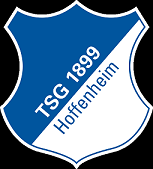A new footballing force has risen in Germany rapidly and rather unnoticed over the past few years. TSG Hoffenheim were competing as an amateur team back in the early 1990s, with the team in disarray on and off the playing field. Drastic measures were needed. Step foward local businessman Dietmar Hopp, one of the richest men in Germany. The club has been nurtured slowly and with the correct infrastucture put in place, TSG Hoffenheim are now deservedly punching above their weight, competing alongside the giants of Bayern Munich.
A new footballing force has risen in Germany rapidly and rather unnoticed over the past few years. TSG Hoffenheim were competing as an amateur team back in the early 1990s, with the team in disarray on and off the playing field. Drastic measures were needed. Step foward local businessman Dietmar Hopp, one of the richest men in Germany. The club has been nurtured slowly and with the correct infrastucture put in place, TSG Hoffenheim are now deservedly punching above their weight, competing alongside the giants of Bayern Munich.  These two teams couldn’t be further apart in terms of players and financial backing, though you would not know this by looking at the league table. TSG Hoffenheim are currently in second place in the Bundesliga, eight places above Bayern Munich. IMScouting.com, a major new football online database launched last month, has compiled a list of revealing statistics based on the squads of the two team. Highlighting the financial gulf between the two sides, IMScouting’s data reveals Bayern Munich’s estimated annual salary for their planning staff for the 2008/9 season is a staggering €60m, compared to Hoffenheim’s modest €13m, the lowest in the Bundesliga. TSG Hoffenhiem have never been in the top flight before, having won back to back promotions from the third division.
These two teams couldn’t be further apart in terms of players and financial backing, though you would not know this by looking at the league table. TSG Hoffenheim are currently in second place in the Bundesliga, eight places above Bayern Munich. IMScouting.com, a major new football online database launched last month, has compiled a list of revealing statistics based on the squads of the two team. Highlighting the financial gulf between the two sides, IMScouting’s data reveals Bayern Munich’s estimated annual salary for their planning staff for the 2008/9 season is a staggering €60m, compared to Hoffenheim’s modest €13m, the lowest in the Bundesliga. TSG Hoffenhiem have never been in the top flight before, having won back to back promotions from the third division.
Pini Zahivi, the agent behind IMScouting.com, was asked why more and more teams such as Hoffenheim were competing so well against their established and wealthy rivals. He said, ‘The gap between the big clubs and the so-called smaller clubs is not as great as many people think. Clubs like Hoffenheim are competing admirably due to the scouting networks they have in place. They are making good strategic decisions with the long term focus on the financial stability of the club.’ Other examples can be found throughout Europe. In Spain, La Liga side UD Almeria finished 8th in their debut season, defeating Real Madrid, Valencia and Sevilla along the way. This season they have reached 6th, just two points behind FC Barcelona and Real Madrid. In the Premiership, Hull City have beaten both Spurs and Arsenal away from home, with a squad made up largely of lower league players and free transfers. IMScouting.com reports that Hull’s entire squad was put together at an estimated cost of £8.9m, whilst Spurs spent £66.2m last summer alone. In the Netherlands, FC Groningen, NAC Breda and Heerenveen are challenging the dominance of the likes of Ajax and Feyenoord. IMScouting.com argue that online databases like theirs will help smaller clubs to gain access to a huge amount of global player data online, informing and influencing their transfer decisions.
Related Posts:
The Hull Phenomenon – 26/10/2008
Hull City were tipped for an instant return to the Championship at the beginning of the season, but their victory against West Brom on Saturday made them joint first at the top of the Premiership before today’s matches…
Is Germany a Fans’ Paradise? – 02/06/2008
State of the art facilities at German football grounds include designated standing areas, and clubs have kept ticket prices relatively low…
